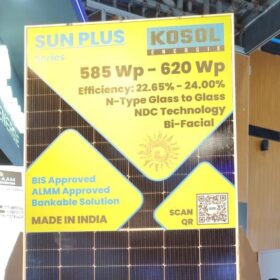Of the 26,449 MW of capacity that has been approved for 45 solar parks across 22 states, Gujarat has received the green light for developing 6,200 MW via three projects: 700 MW at Radhanesada, 500MW at Harshad, and 5,000 MW at the Dholera Special Investment Region (DSIR). When completed, the latter will be the world’s largest solar park.
Gujarat is followed by Rajasthan, with 4,331 MW approved for six projects. Andhra Pradesh, meanwhile, has been given the go ahead to install 4,160 MW over four parks; Madhya Pradesh, 2,750 MW across five parks; Maharashtra, 1,805 MW over six parks; and Uttar Pradesh, 570 MW for four parks. The 2,000MW Pavagada Solar Park is the sole project approved for Karnataka.
Pioneering
Gujarat is a pioneer in harnessing solar energy, having already established a ready Solar Power Policy as early as 2009. By 2012, the state had 600 MW of operational PV power, which accounted for nearly 90% of the country’s total solar capacity.
In April 2012, Gujarat Solar Park, India’s first solar park, was set up in Charanka Village (Patan district). It was the world’s first multi-developer, multi-facility, multi-technology and multi-beneficiary solar park.
Meanwhile, the world’s first canal-top solar project on Narmada branch canal network was also installed in Gujarat. Launched in 2016, Dhundi Saur Urja Utpadak Sahakari Mandali (DSUUSM) in the state’s Dhundi village was the world’s first solar irrigation cooperative.
With an installed solar power capacity of 1,612 MW, Gujarat ranks sixth in the country’s solar capacity ranking. Telangana tops the list with 3,200 MW, followed by Karnataka, Rajasthan, Andhra Pradesh and Madhya Pradesh. Overall, Gujarat is aiming to install 2,000 MW of new solar power capacity each year until 2022.
This content is protected by copyright and may not be reused. If you want to cooperate with us and would like to reuse some of our content, please contact: editors@pv-magazine.com.







By submitting this form you agree to pv magazine using your data for the purposes of publishing your comment.
Your personal data will only be disclosed or otherwise transmitted to third parties for the purposes of spam filtering or if this is necessary for technical maintenance of the website. Any other transfer to third parties will not take place unless this is justified on the basis of applicable data protection regulations or if pv magazine is legally obliged to do so.
You may revoke this consent at any time with effect for the future, in which case your personal data will be deleted immediately. Otherwise, your data will be deleted if pv magazine has processed your request or the purpose of data storage is fulfilled.
Further information on data privacy can be found in our Data Protection Policy.